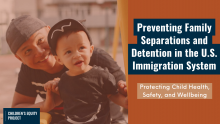Found 88 resources.
0
0
0
Topics: Low-income
 Shared by Destiny Clark
on Apr 18, 2024
Shared by Destiny Clark
on Apr 18, 2024 0
0
0

Social service programs are often looking for ways to assess and improve program design and implementation, and are increasingly using rapid learning methods to do so. In rapid learning cycles, programs try a new approach, see how well it works, make modifications to strengthen it, and then try it again. This brief illustrates how 10 fatherhood programs used learning cycles to evaluate one of three promising approaches to engaging men in their services, and the ways they used data in the learning cycle process to make decisions about the design and implementation of the approaches. Even...
Topics: Family engagement, Healthy homes, Research
 Shared by Sandra Ware
on Jun 8, 2023
Shared by Sandra Ware
on Jun 8, 2023 0
0
0

This document summarizes what was learned in SIRF (Strengthening the Implementation of Responsible Fatherhood Programs), which engaged 10 programs in using learning cycles—repeated periods of implementing ideas and reflecting on the results—to build evidence on practices to improve the enrollment, engagement, and retention of fathers in fatherhood programs.
Topics: Family engagement, Research
 Shared by Sandra Ware
on Jun 8, 2023
Shared by Sandra Ware
on Jun 8, 2023 0
0
0

Unfortunately, there are more youth experiencing homelessness than there are resources available. Up to 40% of youth experiencing homelessness identify as lesbian, gay, bisexual, transgender, and queer/questioning (LGBTQ+). Homelessness is often the result of multiple factors including historical and present systemic racism, discrimination, and socio-economic inequities. Learn more in our new policy brief.
Topics: Criminal justice, Homelessness, Housing, Legislation & Policy, Mental health, Racial inequalities, Safety, Stability, Youth
 Shared by Sandra Ware
on Jun 8, 2023
Shared by Sandra Ware
on Jun 8, 2023 0
0
0

ASTHO comes to our health agencies and partners saddened by our country's recent mass shooting. We mourn the losses of life from firearm violence as our families, schools, and communities continue to be impacted. ASTHO supports you now more than ever. The epidemic of firearm-related injury and death in the United States has become a critical public health and safety concern that affects everyone.
Topics: Community development, Criminal justice, Health, Mental health, Research
 Shared by Sandra Ware
on May 25, 2023
Shared by Sandra Ware
on May 25, 2023 0
0
0

Family separations and family detention have been used as part of immigration enforcement in the United States. These practices and policies are severely detrimental to child health and wellbeing and can cause lasting harm.
This brief reviews the state of the research on the developmental, psychological, and physical toll of family separation and family detention on children and their caregivers. Grounded in this science, we provide a set of policy recommendations that protect child health and wellbeing.
Topics: Child welfare, Early childhood, Health, Immigrants, Legislation & Policy, Mental health, Youth
 Shared by Sandra Ware
on Mar 30, 2023
Shared by Sandra Ware
on Mar 30, 2023 0
0
0
Social media tool kit to promote and advertise the December 6th Virtual Spotlight – LGBTQ+/SGL* – Affirming Housing for Older People event.
Topics: Community development, Housing, Seniors
 Shared by Sandra Ware
on Nov 29, 2022
Shared by Sandra Ware
on Nov 29, 2022 0
0
0
Successful diabetes care for vulnerable populations demands a multi-prong approach, deploying direct health interventions, medications, and support from a range of community resources to address the social determinants, which impact diabetes. This brief will highlight, through case studies and program descriptions, the important role of non-clinical staff in both the health center and housing setting to support individuals and families struggling to prevent and keep diabetes conditions under control.
Topics: Health, Housing
 Shared by Sandra Ware
on Nov 29, 2022
Shared by Sandra Ware
on Nov 29, 2022 0
0
0
The series highlights the promising work of the EHS-CCPs to date, particularly related to pandemic recovery and stabilization, workforce support, and expanding access to holistic support for children and families, especially mental health support. The briefs highlight the many roles that states can play in establishing and expanding their own EHS-CCPs, including by using Preschool Development Grant Birth to Five funding and aligning CCDF quality funding with supports needed to establish and grow the Early Head Start model.
The EHS-CCPs take many forms in states and communities across the...
Topics: Child welfare, COVID-19, Health, Mental health, Workforce development
 Shared by Sandra Ware
on Nov 3, 2022
Shared by Sandra Ware
on Nov 3, 2022 0
0
0
Medical debt is a critical challenge to Americans’ financial stability and well-being. People with medical debt are more likely to forgo needed medical care, have difficulty meeting basic needs, and face an increased risk of bankruptcy.
Recent Urban research shows there are great disparities in who carries the most medical debt. Adults who live in communities where the majority of the population are people of color are more likely to have medical debt in collections reported on their credit reports. In particular, Black adults are more likely to have difficulty paying for family medical...
Topics: Asset building, Dual-eligibles, Health, Legislation & Policy, Low-income, Medicaid / Medicare, Racial inequalities
 Shared by Sandra Ware
on Oct 27, 2022
Shared by Sandra Ware
on Oct 27, 2022 0
0
0
Approximately one in five adults reported experiencing household food insecurity in both spring 2020 and again in summer 2022, after a decline in reported food insecurity in spring 2021. High food price inflation, along with elevated costs for other basic needs, such as transportation and rent, have likely eroded food budgets in the last year. In addition, some of the safety net responses that buffered food insecurity in 2021 are no longer in place. In this brief, we use data from the Health Reform Monitoring Survey, a nationally representative survey of nonelderly adults, to assess food...
Topics: Food insecurity, Research, Stability
 Shared by Sandra Ware
on Oct 27, 2022
Shared by Sandra Ware
on Oct 27, 2022 0
0
0
Disabled individuals and families in federally assisted housing face multiple challenges in gaining access to housing units and services that meet their needs—despite legal frameworks meant to help them. This brief focuses on working-age disabled individuals and families with a disabled household member who live in federally assisted housing. It presents evidence of the challenges with federally assisted housing processes and supports for residents with disabilities, and provides recommendations that could help these processes and supports better meet legal obligations and resident needs.
Topics: Disabilities, Family engagement, Housing
 Shared by Sandra Ware
on Oct 27, 2022
Shared by Sandra Ware
on Oct 27, 2022 0
0
0
Join the Housing Is Working Group for webinars, member updates, and round table discussions! This resource provides the 2022-2023 Calendar of Events.
Topics: CLPHA, Housing, Housing Is Working Group
 Shared by Camille Anoll-Hunter
on Aug 30, 2022
Shared by Camille Anoll-Hunter
on Aug 30, 2022 0
0
0
A new D.C. Federal Nutrition Programs Toolkit is designed to help community-based organizations, social service and healthcare providers, District agencies, and community members connect low-income households with federal nutrition programs. Beverley Wheeler, director of D.C. Hunger Solutions, told The DC Line, “with this toolkit, our community leaders can play a key role in ensuring children, young adults, adults, and older adults can connect with the right providers to help gain access to the nutrition they need for their health and well-being.”
Topics: East Coast, Food insecurity
 Shared by Kirsten Greenwell
on Jul 30, 2021
Shared by Kirsten Greenwell
on Jul 30, 2021 0
0
0
Every child in an early childhood setting should have a teacher with specialized education to promote that child’s cognitive, social, emotional, and physical development and who prepares them for success in school and in life. The National Research Council’s report from a panel of experts, Transforming the Workforce for Children Birth Through Age 8: A Unifying Foundation, lays out several recommendations for programs serving children from birth through age 8, notably that teachers "should have at a minimum a bachelor’s degree and specialization in the knowledge and competencies needed to...
Topics: Early childhood, Education, Post-secondary
 Shared by Kirsten Greenwell
on Jun 30, 2021
Shared by Kirsten Greenwell
on Jun 30, 2021 0
0
0
In March 2020, the COVID-19 pandemic forced many public housing authorities (PHAs) to quickly adjust their operational procedures to protect their staff while providing emergency assistance to residents. Many PHAs had to close their offices and convert to remote operations almost overnight, while staff focused on supporting their tenants by delivering them food, doing wellness checks for vulnerable residents, and ensuring they had access to and in some cases providing the technology needed for children to attend school remotely and isolated residents to remain connected to friends, family,...
Topics: Advocacy, COVID-19, Data sharing, Health, Housing, Safety, Supportive housing
 Shared by Housing Is
on May 25, 2021
Shared by Housing Is
on May 25, 2021 0
0
0
Colleges support students with advising, counseling, or coaching in academics and other skills they need to succeed in school. Some colleges enhance those services through reduced adviser caseloads and more comprehensive, frequent guidance, which can improve students’ semester-to-semester retention and average credits earned. This overview describes important lessons on designing and implementing those services. College leaders and administrators committed to designing, building, managing, and continually supporting enhanced advising services can consult this checklist of recommendations as...
Topics: Attendance, Child welfare, Community development, Education, Grade-level proficiency, Post-secondary, Workforce development
 Shared by Housing Is
on Mar 4, 2021
Shared by Housing Is
on Mar 4, 2021 0
0
0
The National Asian Pacific Center on Aging has launched a an automated COVID-19 in-language helpline and website for older adults and their caregivers.The helpline offers information on prevention, symptoms, and planning in 8 different languages. Each language will have a dedicated 1-800 line so that older adults who are limited English-proficient can immediately learn about the COVID-19 without having to navigate through difficult English prompts.
Topics: Communications
 Shared by Kirsten Greenwell
on Mar 23, 2020
Shared by Kirsten Greenwell
on Mar 23, 2020 0
0
0
Special edition of CLPHA newsletter detailing the organization's efforts in response to COVID-19.
Topics: Advocacy, CLPHA, Communications, Health, Seniors
 Shared by Steve Lucas
on Mar 23, 2020
Shared by Steve Lucas
on Mar 23, 2020 0
0
0
From CDC: "Residents in retirement communities and ILF are considered to be at higher risk of severe COVID-19 outcomes because of older age and because they may have underlying health conditions, such as chronic heart disease, diabetes, or lung disease. They also may be at higher risk of getting and spreading the virus because of community characteristics, such as frequent social activities, and shared dining facilities and communal spaces. Guidance specific to retirement and independent living communities can help the residents, and those who help serve them, slow the spread of the...
Topics: Health, Seniors
 Shared by Steve Lucas
on Mar 22, 2020
Shared by Steve Lucas
on Mar 22, 2020 0
0
0
Offers community-specific COVID-19 mitigation plans and guidance on how to prepare and take action for COVID-19 at home and at workplaces, schools, childcare programs, colleges, universities, large community events/mass gatherings, homeless shelters, and other locations.
Topics: Communications
 Shared by Kirsten Greenwell
on Mar 17, 2020
Shared by Kirsten Greenwell
on Mar 17, 2020 0
0
0
Print resources from the CDC about coronavirus symptoms, prevention, and treatment to distribute and post in your communities.
Topics: Communications
 Shared by Kirsten Greenwell
on Mar 17, 2020
Shared by Kirsten Greenwell
on Mar 17, 2020 0
1
0
The CDC's landing page for official COVID-19 guidance to communities and individuals.
Topics: Health
 Shared by Steve Lucas
on Mar 16, 2020
Shared by Steve Lucas
on Mar 16, 2020 0
0
0
CLPHA is continually updating a central COVID-19 landing page that includes the latest CDC guidance, member-generated resources, and information from CLPHA member calls related to COVID-19 (e.g. call notes, insights from speakers). We encourage you to share your resources with us and fellow members in this online community and/or by emailing them to the CLPHA team at clpha@clpha.org.
Topics: Health
 Shared by Steve Lucas
on Mar 16, 2020
Shared by Steve Lucas
on Mar 16, 2020 0
0
0

In California, more than 3.7 million students were eligible for free or reduced priced school meals in the 2017-2018 school year. For many of those students, school meals are the primary source of regular access to healthy food. When the bell rings at 3:00 or lets out for summer break, many of those students go home to nutritional uncertainty or high-calorie, low-nutrient foods.
For many low-income families, the out-of-school-time food access gap increases family stress: limited budgets are stretched further to cover food, rent, utilities, transportation, medications, and chidcare costs....
Topics: Advocacy, Early childhood, Food insecurity, Health, Healthy homes, Housing, Legislation & Policy, Low-income, Nutrition, Out-of-school time, West Coast, Youth
 Shared by Linda Lu
on Dec 4, 2019
Shared by Linda Lu
on Dec 4, 2019 
